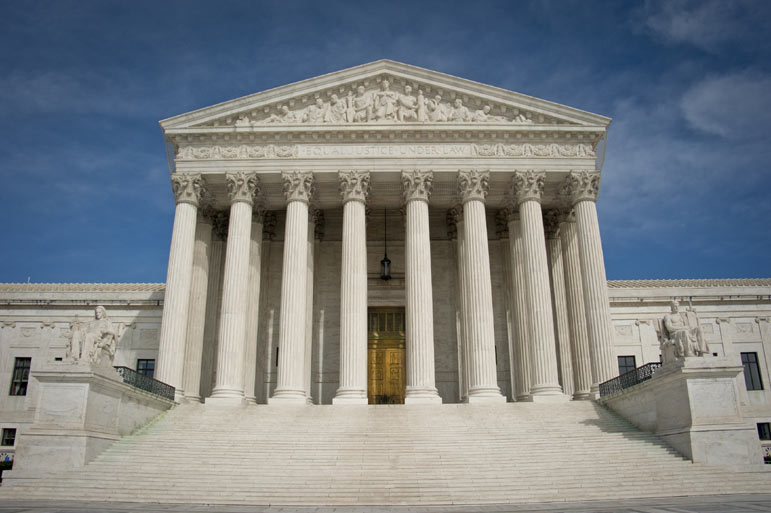
The U.S. Supreme Court will take up this question Wednesday in Bank Markazi v. Peterson -- and it's legally tricky as well as politically sensitive. Since just after the Civil War, the Supreme Court has struggled to articulate a principle of judicial independence that would prohibit a law dictating the result of a particular case while recognizing Congress's power to dictate outcomes through substantive law. After the U.S.-Iran nuclear deal, this old issue has a new context. Iran won't be too happy if the court lets Congress get away with breaking the usual legal rules, including state immunity, to seize the country's money.
The facts of the case are pretty simple. The sister of a Marine killed in the 1983 Beirut barracks bombing sued the government of Iran for damages. Her lawsuit was joined with one by relatives of those killed in the 1996 Khobar Towers bombing in Saudi Arabia, also attributed to Iran. The government of Iran refused to defend the suit, relying on the principle of sovereign immunity, which says that a sovereign government ordinarily can't be sued in the courts of another state without its consent.
In the absence of a defense, Iran lost, and the families went after Iranian assets by tracking bonds owned by Bank Markazi, the central bank of Iran, through a series of European banks to Citibank in New York. Today the bonds are worth about $2 billion.
Here things get legally weird. While the attempt to recover damages was pending, the families lobbied Congress, which passed a special law, 22 U.S.C. § 8772, as part of the Iran Threat Reduction and Syria Human Rights Act of 2012. That law specified that "the financial assets that are identified in and the subject of proceedings in … Peterson et al. v. Islamic Republic of Iran" should be used "in order to satisfy any judgment to the extent of any compensatory damages awarded against Iran for terrorism.
It's highly unusual for a law to target a specific case, especially one in progress. The district court responded by obeying the law and granting the assets to the families. The U.S. Court of Appeals for the 2nd Circuit upheld the judgment.
Iran's argument before the Supreme Court rests on an 1871 case called U.S. v. Klein, which involved a federal law passed during Reconstruction. Southerners were attempting to use the federal courts to recover property seized by the Union during the Civil War; if the person was shown to have been disloyal during the war, he wasn't supposed to recover. Congress passed a law saying that if a Southerner had received a pardon after the war, the courts should treat that fact as conclusive evidence that he was disloyal and therefore couldn't recover.
The Supreme Court struck down the law. It observed that the "great and controlling purpose" of the law was "to deny to pardons granted by the President the effect which this court had adjudged them to have," namely protecting those pardoned from legal consequences of their earlier disloyalty. The court then framed the problem as one of the separation of powers. It said it could not apply the law "without allowing that the legislature may prescribe rules of decision to the Judicial Department of the government in cases pending before it."
In principle, the Klein precedent stands for the idea that Congress improperly violates judicial independence when it tells courts exactly how to decide particular cases being adjudicated. That sounds like it should apply to the Bank Markazi case, as the bank now maintains.
The trouble is that Congress does have the authority to change a law while a case is being decided -- and the courts are supposed to follow the new law. What's more, it's devilishly difficult to explain why Congress shouldn't be able to pass a law applying to a particular case. After all, all cases arising under federal law are supposed to be decided according to the dictates of Congress.
The Klein precedent is hoary enough that it's never been overturned -- and the Roberts court isn't likely to abandon it either. But in 1992, the court upheld a law that specifically directed results in two named environmental suits involving the habitat of the spotted owl. In so doing, the court sidestepped Klein by saying it didn't apply where a law was being amended.
The court is likely to duck the Klein precedent again in the Iran case -- because it's too hard to say what principle Klein really embodies. But the fact that the court took the case at all, over the objections of Barack Obama's administration, signals that it knows the case is a big deal. After the recent thaw in Iran-U.S. relations, it's a bigger deal than before.
The bottom line is that, whatever the court decides, it's bad practice for Congress to intervene in ongoing suits to dictate outcomes -- because it distorts the appearance of justice and demeans the legal process. If Iran loses, it'll say that the U.S. legal process isn't fair. It won't distinguish Congress from the courts.
That congressional distortion of the legal process is exactly what the court in the Klein case didn't like. Almost 150 years later, Congress hasn't learned. The court probably won't teach them the lesson this time. And perhaps, in a sense, that's a shame.
Comment by clicking here.
Noah Feldman, a Bloomberg View columnist, is a professor of constitutional and international law at Harvard University and the author of six books, most recently "Cool War: The Future of Global Competition."


 Contact The Editor
Contact The Editor
 Articles By This Author
Articles By This Author
